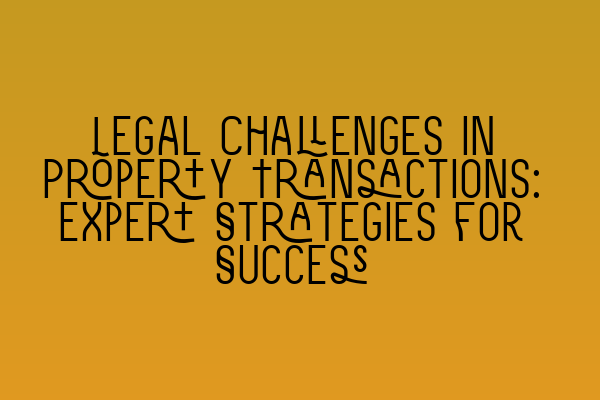Legal Challenges in Property Transactions: Expert Strategies for Success
Property transactions can be complex and fraught with legal challenges. From residential purchases to commercial leases, navigating the intricacies of property law requires expert knowledge and strategic planning. In this blog post, we will explore some common legal challenges that arise in property transactions and provide expert strategies for success.
1. Title Issues
One of the first and most critical steps in any property transaction is ensuring that the title is clear and free from any encumbrances. Title issues, such as undisclosed easements, liens, or boundary disputes, can create significant obstacles in the transaction process.
To avoid potential complications, it is essential to conduct a thorough title search. This search will uncover any existing liens, encumbrances, or legal disputes associated with the property. By addressing these issues early on, you can negotiate with the other party or take appropriate legal action to resolve the problem.
2. Financing Challenges
Securing financing for a property purchase can be a daunting task. Lenders have strict requirements, and any issues with credit, income, or appraisal can derail the financing process.
It is crucial to ensure that your financials are in order before embarking on a property transaction. This includes having a good credit score, stable employment history, and the necessary down payment. Working with a mortgage broker or financial advisor can help streamline the financing process and increase the chances of securing the necessary funds.
SQE 1 Practice Mocks FLK1 FLK2
3. Zoning and Planning Restrictions
Zoning and planning regulations can significantly impact property transactions, especially for commercial properties. These restrictions dictate how the property can be used, what modifications can be made, and the overall development potential.
Before proceeding with a property transaction, it is vital to conduct thorough research on the zoning and planning regulations applicable to the property. This includes reviewing the local zoning ordinances, contacting the local planning department, and working with an experienced property lawyer who can guide you through the process.
4. Environmental Concerns
Environmental issues can have a significant impact on property transactions, particularly for commercial properties. Potential contaminants, hazardous materials, or contaminated groundwater can pose health risks and legal liabilities.
Prior to closing a property transaction, it is essential to conduct an environmental assessment. This assessment involves evaluating the property for any environmental risks or contamination. If any issues are discovered, remediation measures may be necessary before finalizing the transaction.
5. Contractual Disputes
Contractual disputes can arise during any stage of a property transaction. Whether it’s a disagreement over the terms of the purchase agreement, non-disclosure of material defects, or issues with the closing process, resolving these disputes can be time-consuming and costly.
When entering into a property transaction, it is crucial to have a well-drafted and comprehensive contract. Working with an experienced property lawyer to review and negotiate the contract can help mitigate the risk of contractual disputes. Additionally, having a dispute resolution mechanism, such as arbitration or mediation, included in the contract can help expedite the resolution process.
Conclusion
Property transactions are complex undertakings that require careful attention to detail and expert legal guidance. By understanding and proactively addressing the common legal challenges in property transactions, you can increase the chances of a successful and smooth transaction.
If you require assistance with your property transaction or need expert advice on property law matters, do not hesitate to contact SQE Property Law & Land Law. Our team of experienced solicitors is here to help you navigate through any legal challenges and ensure a successful outcome.
